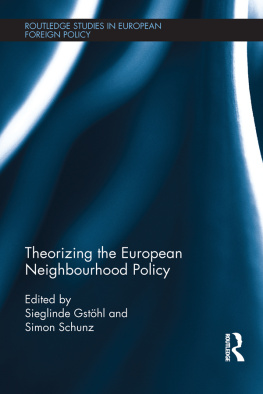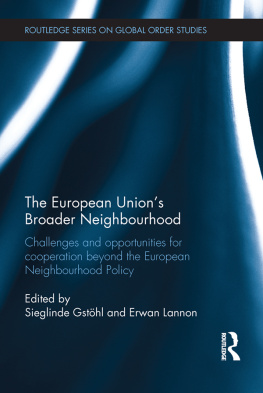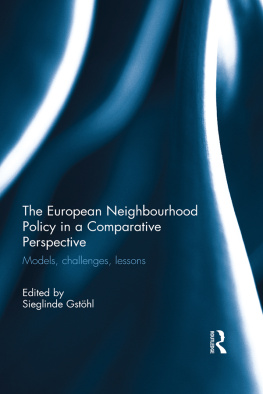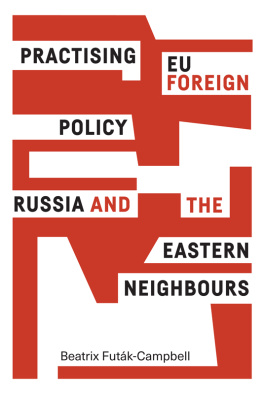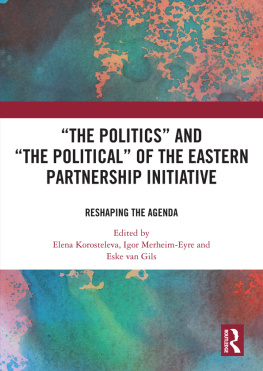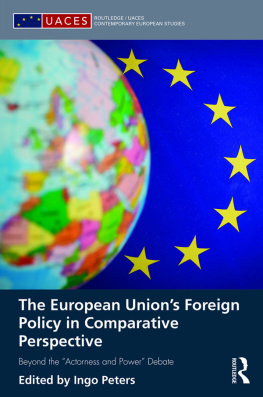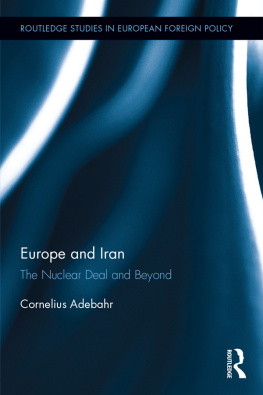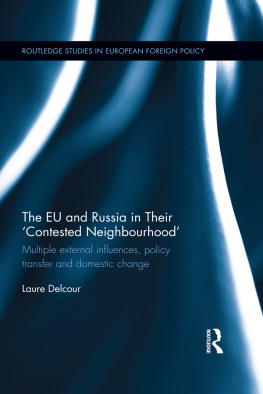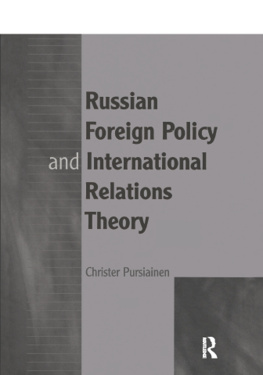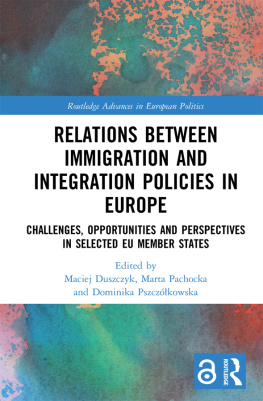Theorizing the European Neighbourhood Policy
Despite growing scholarly interest in the EUs flagship policy towards its Eastern and Southern neighbours, serious attempts at theory-building on the European Neighbourhood Policy (ENP) have been largely absent from the academic debate.
This book aims at contributing to fill this research gap in a threefold manner: first and foremost, it aims to theorize the ENP as such, explaining the origins, development and effectiveness of this policy. Building on this effort, it also pursues the broader objective of addressing certain shortcomings in EU external relations theory, and even beyond, in international relations theory. Finally, it aspires to provide new insights for European policymakers. It is one of the first volumes to provide different theoretical perspectives on the ENP by revisiting and building bridges between mainstream and critical theories, stimulating academic and policy debates and thus setting a novel, less EU-centric research agenda.
This text will be of key interest to scholars, students and practitioners in EU external relations, EU foreign policy, the European Neighbourhood Policy and more broadly in European Union politics and international relations.
Sieglinde Gsthl is director of the Department of EU International Relations and Diplomacy Studies at the College of Europe in Bruges, Belgium.
Simon Schunz is professor in the Department of EU International Relations and Diplomacy Studies at the College of Europe and Research Fellow at the UN University Institute on Comparative Regional Integration Studies (UNU-CRIS) in Bruges, Belgium.
Routledge Studies in European Foreign Policy
Series Editors:
Richard Whitman
University of Kent, UK
and
Richard Youngs
University of Warwick, UK
This series addresses the standard range of conceptual and theoretical questions related to European foreign policy. At the same time, in response to the intensity of new policy developments, it endeavours to ensure that it also has a topical flavour, addressing the most important and evolving challenges to European foreign policy in a way that will be relevant to the policymaking and think tank communities.
The European Union in International Climate Change Politics
Still Taking a Lead?
Rdiger Wurzel, James Connelly and Duncan Liefferink
Theorizing the European Neighbourhood Policy
Edited by Sieglinde Gsthl and Simon Schunz
First published 2017
by Routledge
2 Park Square, Milton Park, Abingdon, Oxon OX14 4RN
and by Routledge
711 Third Avenue, New York, NY 10017
Routledge is an imprint of the Taylor and Francis Group, an informa business
2017 selection and editorial matter, Sieglinde Gsthl and Simon Schunz; individual chapters, the contributors
The right of Sieglinde Gsthl and Simon Schunz to be identified as the authors of the editorial matter, and of the authors for their individual chapters, has been asserted in accordance with sections 77 and 78 of the Copyright, Designs and Patents Act 1988.
All rights reserved. No part of this book may be reprinted or reproduced or utilized in any form or by any electronic, mechanical, or other means, now known or hereafter invented, including photocopying and recording, or in any information storage or retrieval system, without permission in writing from the publishers.
Trademark notice: Product or corporate names may be trademarks or registered trademarks, and are used only for identification and explanation without intent to infringe.
British Library Cataloguing in Publication Data
A catalogue record for this book is available from the British Library
Library of Congress Cataloging in Publication Data
Names: Gstohl, Sieglinde, 1964 editor. | Schunz, Simon.
Title: Theorizing the European neighbourhood policy / edited by Sieglinde Gstohl and Simon Schunz.
Description: Milton Park, Abingdon, Oxon ; New York, NY : Routledge, 2017. | Includes bibliographical references and index.
Identifiers: LCCN 2016032744| ISBN 9781138204799 (hardback) |
ISBN 9781315468693 (ebook)Subjects: LCSH: European Neighbourhood Policy (Program) | European Union countriesForeign relations. | European Union countriesForeign economic relations.
Classification: LCC JZ1570.A5 T47 2017 | DDC 341.242/2dc23LC record available at https://lccn.loc.gov/2016032744
ISBN: 978-1-138-20479-9 (hbk)
ISBN: 978-1-315-46869-3 (ebk)
Typeset in Times New Roman
by Wearset Ltd, Boldon, Tyne and Wear
Contents
JOHANES HAHN, EUROPEAN COMMISSIONER
SIEGLINDE GSTHL
PART I
Rationalism vs. constructivism: inside-out and outside-in
ELSA TULMETS
SARA KAHN-NISSER
SERENA GIUSTI
NATALIA G. ZASLAVSKAYA
PART II
Beyond EU-centrism: neglected (f)actors
TEODOR LUCIAN MOGA
PANAGIOTA MANOLI
RYHOR NIZHNIKAU
MICHAL NATORSKI
PART III
The EU and the other(s): conflict or cooperation?
LAURE DELCOUR AND KATARYNA WOLCZUK
UELI STAEGER
ELENA A. KOROSTELEVA, IGOR MERHEIM-EYRE AND ESKE VAN GILS
NICOLA DEL MEDICO
SIMON SCHUNZ
Laure Delcour is scientific coordinator of the EU-FP7 project CASCADE (Exploring the SecurityDemocracy Nexus in the Caucasus) and visiting professor at the College of Europe in Bruges. She holds a PhD and an MA in political science from Sciences Po, Paris, and a BA in history from Paris IV-Sorbonne. Her research focuses on the EUs influence on domestic change in post-Soviet countries and region-building initiatives in the post-Soviet area. Her recent publications include Shaping the Post-Soviet Space: EU Policies and Approaches to Region-Building (Ashgate, 2011); The EUs Unexpected Ideal Neighbour? The Perplexing Case of Armenias Europeanisation, Journal of European Integration 37(4), 2015, 491507 (with K. Wolczuk); and Spoiler or Facilitator of Democratization? Russias Role in Georgia and Ukraine, Democratization 22(3), 2015, 45978 (with K. Wolczuk).
Nicola Del Medico has since 2014 been academic assistant in the Department of EU International Relations and Diplomacy Studies at the College of Europe in Bruges. He holds an MA from that department as well as an MA and a BA in international relations from LUISS University in Rome, including an exchange semester at MGIMO University in Moscow. He has previous work experience as a trainee in the Italian Prime Ministers Office (2013), as a Blue Book trainee at the European Commission Representation in Rome (201213) and as an intern in the Italian Ministry of Foreign Affairs (2011).
Serena Giusti is assistant professor in international relations and foreign policy analysis at SantAnna School of Advanced Studies in Pisa, where she holds a Jean Monnet Module on The EUs responses to the challenges of its neighbourhood. She is a senior associate research fellow at the Institute for International Political Studies (ISPI) in Milan. She holds a PhD in political and social sciences from the European University Institute in Florence and an MA in European studies from the College of Europe at Natolin (Warsaw). She worked for the European Commission, UNICEF-ICDC and the OSCE. She has extensively published on the transformation of Central and Eastern European countries, on the EUs enlargement and neighbourhood policies and on Russias foreign policy.

